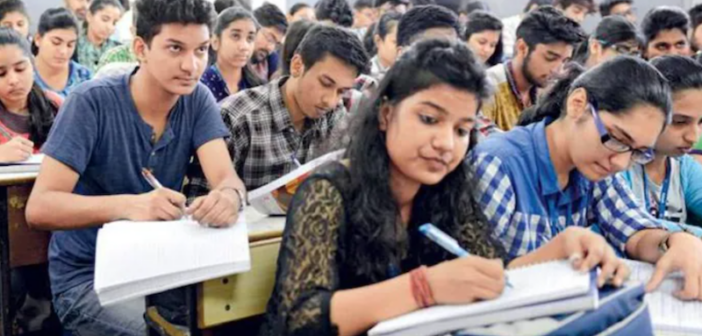The unfortunate incident at Rau’s IAS coaching centre in New Delhi, where three students lost their lives has put spotlight on the rapid growth of coaching hubs offering private classes. There is significant demand for coaching classes, fuelled by intense competition for scarce university spots, particularly in science programs offering better career opportunities, and coveted jobs like the IAS, IPS, etc. The official GST collections from coaching institutions in India rose from Rs. 2240 Crore in 2019-20 to Rs. 5517 Crore in 2023-24 as per government data.
In an unfortunate incident at Rau’s IAS coaching centre in Old Rajinder Nagar, Central Delhi, three students lost their lives after rainwater flooded the basement library on 27 July 2024. This has put the spotlight on the rapid growth of coaching hubs offering private classes. In this article, we explore various aspects of the phenomenon of private coaching centres, examine the regulatory framework governing them, and present key statistics on the growing preference for private coaching classes in India.
Evolution of Coaching Centres in India
The coaching industry has transformed over time to cater to the increasing demand from students and parents for additional academic support beyond school or college to improve grades. This evolution has given rise to a substantial market for coaching classes, fuelled by intense competition for scarce university spots, particularly in science programs offering better career opportunities, and coveted jobs like the IAS, IPS, etc.
Private tutoring spans a broad spectrum, addressing varied learner requirements and inclinations. On one side, individualized instruction provides custom-tailored support, often held at either the mentor’s or learner’s residence. Conversely, mass tutoring sessions can occur in auditoriums, occasionally needing additional spaces equipped with video feeds to accommodate the overflow of participants.
The market size of private coaching classes is estimated to reach 1.33 Lakh Crore by 2028 as per a Private consultancy firm. The official GST collections from coaching institutions in India rose from Rs. 2240 Crore in 2019-20 to Rs. 5517 Crore in 2023-24 (almost 150% rise).
One-fifth of Indian students had taken private coaching, as per NSS 2018 Report
The National Sample Survey Organization’s reports on education indicators in India from 2014 and 2018 reveal intriguing trends. According to these reports, private coaching is defined as when a student enrolled in a primary course and an additional course (other than the primary one) was considered to be receiving private coaching if they had taken or were taking coaching for the primary course.
In the 71st Round of 2014, about 26% of students across India were receiving private coaching, with 27.3% of males and 24.3% of females participating. Regionally, the figures showed 22.6% in rural areas and 34.2% in urban areas. By the 75th Round in 2018, these figures had slightly decreased. Approximately 17.3% of students in rural areas and 26% in urban areas were engaged in private coaching. On a national scale, around 20% (or one-fifth) of students were involved in private coaching, regardless of their educational level.
Average expenditures on private coaching declined, as course fees grow
Private education expenditure includes various items such as course fees, books, stationery, uniforms, transport, and private coaching. In the NSS 75th round, students residing in hostels were listed as single-member households, and their education expenses were collected directly from them. Conversely, in the NSS 71st round, hostel students were considered members of their original households, and their education expenses were collected from those households.
For students pursuing general courses, the share of average expenditure on private coaching decreased from 14.1% to 11.2% in rural areas, 16.5% to 12.3% in urban areas, and from 15.3% to 11.8% overall. Similarly, for students pursuing technical courses, the share of average expenditure on private coaching fell from 2.3% to 1.38% in rural areas, 3.1% to 1.8% in urban areas, and from 2.84% to 1.66% overall during these two rounds.
Mushrooming of Private Coaching Centres in India
The growing concerns related to private coaching centres—particularly in light of increasing student suicides, fire incidents, lack of facilities, and questionable teaching methodologies—have periodically drawn the government’s attention. Despite these issues, the number of unregulated private coaching centres continues to rise due to the absence of a formal policy or regulation.
Since Education falls under the Concurrent List, the regulation of +2 level education is primarily within the jurisdiction of State/UT governments. Therefore, it is most effective for State/UT governments to regulate these coaching centres through appropriate legal frameworks.
There were two legislative attempts at controlling the growth of coaching centres. Two private member bills were introduced in Rajya Sabha in 2007 (The Coaching Centres (Regulation and Control) Bill, 2007) and 2010 (The Pre-Examination Coaching Centres Regulatory Authority Bill, 2010). None of them succeeded.
Consequently, the ‘Guidelines for Regulation of Coaching Centres’ have been prepared and are being forwarded to States/UTs for consideration and implementation through suitable legal measures. The Guidelines encompass several key aspects, including defining coaching centres, specifying conditions and necessary documents for registration, addressing issues related to fees, outlining infrastructure prerequisites for establishing coaching centres, and establishing a code of conduct. They emphasize the significance of mental well-being, advocating for the inclusion of counsellors and psychologists within coaching centres, prohibiting batch segregation, and maintaining proper records.
Way forward
From a policy perspective, understanding the prevalence of private tutoring and the socio-economic profiles of attendees is crucial. Additionally, evaluating whether private tutoring enhances student achievement is important. Policymakers need to understand the reasons behind the demand for private tutoring and address these issues within the mainstream education system. Additionally, analysing the socio-economic profiles of students attending private tutoring could suggest whether it serves as a remedial measure for lagging students or exacerbates existing disparities based on parental education and economic backgrounds.



